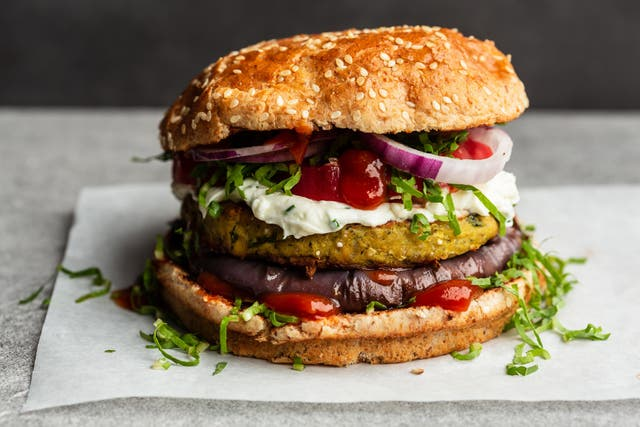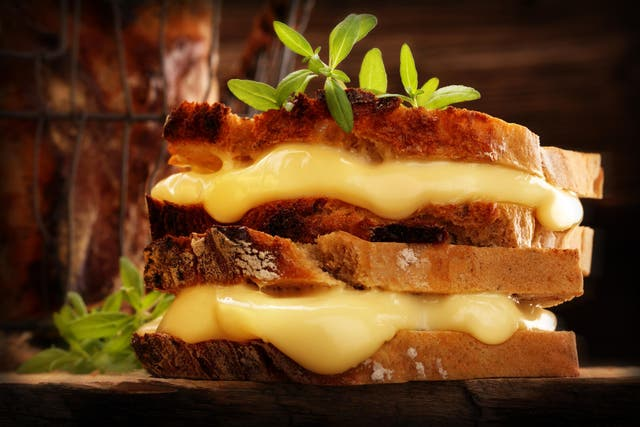




I was 15 when the rippling of an adolescent identity crisis washed over me one Sunday as I began to tuck into the perfectly crisp skin of a juicy chicken thigh. It was 2004 – I remember the year because I was desperate to cut off my chest-length, GHD-straightened hair into something that better served my MySpace persona (it would be another two years before my friends and I join ed Facebook).
Back then, Bin Laden hid safely in his cave and Tony Blair admitted they might not find any WMDs in Iraq, actually. My schoolmates and I had been vehemently anti the Iraq War and it had given us our first taste of activism. Along with it came a wider concern for how I might make a small difference and I developed an interest in animal rights and climate change.
The macerated chicken in my mouth lost its appeal. I spat out my mouthful and announced to my family: “I am a vegetarian”. An eruption of laughter and a swift bollocking for my disgraceful table manners.
I was off to a rocky start. Two weeks in, smug that I’d made it this far and spurred on by everyone who said it was “just a phase”, I learned that taramasalata was made from salmon roe. That was a real bummer. Glancing down at a beige pot of humous, life felt a little bit bleaker.
I’ve been a vegetarian for half my life now and humous is just one, mushy part of the deal. But it’s not all pulverised pulses and flatulence. It has never been easier or more socially acceptable to shun meat. What I’ve learnt over the past 16 years ranges from the culinary to the social. I will recount it for you here.
The first thing you should be aware of before considering going green is how much you can appreciate a lentil on a scale of one to dhal. Before you turn your nose up, lentils are bloody marvellous things. Lentil soup, lentils in risotto, lentils squished into a burger, lentils scattered in salad: they’re great. The other day I even made lentil bolognese. After a decade of iron deficiency, a lentil actually tastes quite meaty.
A decade ago, you could expect to be served up a congealed goat’s cheese flan or spinach and ricotta anything every time you stepped foot inside a restaurant
Tofu is also amazing. Do you know how goddamn versatile that stuff is? I won’t hear a word against it. Anyone that says they don’t like tofu simply has not tried it all its guises; deep-fried tofu tastes completely different from grilled, baked or braised tofu and each type soaks up the flavours of your cooking to transform into a totally different thing. Tofu is an un-hateable food. This is a hill I’m willing to die on
To my disappointment, I discovered early on that it’s quite difficult to be a lazy vegetarian. I struggle to get home after a day at work and whip up a stew. What can I say? I’m not Martha f***g Stewart. So, unless you love pasta or you’re a dab hand at Jamie’s 15-minute meals, you might want to consider getting a slow cooker or a rice cooker or a soup maker or some other idle cooking machine (most of which I own) for those days when you want to come home, eat something with at least a cursory amount of nutrients in it and drop in front of the telly
This is why I live for a meat alternative. Many meat-eaters are oddly incensed at the thought of meat alternatives (I’m looking at you, Piers Morgan), unable, somehow, to understand the concept of someone who enjoys the flavour of meat but chooses to no longer consumer it. It simply baffles their poor minds. But meat alternatives are the perfect way to continue with your go-to meals with just a few swap outs.
A decade ago, you could expect to be served up a congealed goat’s cheese flan or spinach and ricotta anything every time you stepped foot inside a restaurant. Now, any supermarket worth its salt has an entire section dedicated to veggie steaks, fake chicken pieces and meatless meatballs ad infinitum, meaning favourites like carbonara, lasagne and burgers are all still options open to you. This will make you feel as though you haven’t really given up anything and can largely pretend you’re still a meat-eater, snug in the comfort zone of your new and reduced carbon footprint.

This is a wild generalisation based solely on my own limit ed experience, but I’ve found that eating on holiday can be a challenge. In Spain, for example, however much you tell people you are a vegetarian, olives inexplicably come with anchovies stuffed inside them. In France, vegetable soups are often made with beef stock and don’t even try and ask for something fish-free in Denmark. Here, the vegetarian version of the classic “open sandwich” or smørrebrød is potato. Yes, that’s right, potato. On bread.
In the US, you’ll largely be OK in the “hipster” cities, but divert from these and you’ll be chewing on the side orders that come with burgers, burgers or… burgers for your entire trip. It’s hard to know what confuses Americans more, English Breakfast tea or being vegetarian.
Sharpen your elbows at barbecues because meat-eaters will always try and steal the veggie options, seeing them as mere garnish to their meals
Asia, meanwhile, now there’s a continent that knows good vegetarian cuisine. In fact, India has the highest number of vegetarians in the world. Although, in Buddhism, eggs are not considered vegetarian, so be aware of this before you confuse everyone. Watch out for fish sauce in South East Asia though – it comes in everything.
In the UK, we appear determined to confuse everyone; there is now a smorgasbord of words to describe our various dietary preferences. Many pescetarians (people who eat fish but not meat) and flexitarians (people who nobly manage not to eat meat like once a week or something) call themselves vegetarians. These people are wrong. Meanwhile, boomers can’t tell the difference between vegans and vegetarians and try to pry the milk out of your hands every time you visit. Just last week a wedding caterer asked me if I was really a vegetarian or if was it “just an occasional thing” and “would I be willing to just sample the scallops anyway?”
Then there’s the veggiesplaining – you know, when someone tells you they are praaaactically a vegetarian, or they really could be one, they just aren’t. They will tell you they don’t really need to give up meat for the environment, because it’s all about simply checking where their food is sourced before eating it, because sustainable farming is the real issue here, not destruction of the rainforest or extreme amounts of water and methane. Not that you asked, mind. You will definitely see these people face down in a Double Whopper at 4am on Saturday.
On the plus side, veggiesplaining largely comes about because, as vegetarians, our reputations have never been better. I became a vegetarian in a pre-Extinction Rebellion, pre-Greta era, when being environmental or concerned about animal rights wasn’t cool, it was an inconvenience (yes, I bought An Inconvenient Truth on DVD in 2006). Back then, if you told someone you’re veggie you could expect to be kicked out of ther Bebo top friends list. Now, it’s practically a pickup line. The downside to this is that you will need to sharpen your elbows at barbecues because meat-eaters will always try and steal the veggie options, seeing them as mere garnish to their meals.
Aside from your diet, vegetarianism will entirely change people’s perception of you. Which is a weird thing that doesn’t happen with people who “just don’t like mushrooms” or “live for a cheeky Nandos”.
As a veggie, you will be expected to live and die by animal rights and the environment. People assume if you’re vegetarian you are a holier than though prick sent to make them feel guilty about their own life choices. If you wear something that isn’t a hair shirt or a pair of vegan Birkenstocks, you can expect to be subjected to KGB-level interrogation by at least one person at most weddings. “Have you considered the environmental impact of avocados?”, “You went on a PLANE?” or, “are those shoes leather?!” Are just some things a rabid carnivore is likely to ask you while their bleeding steak still pulsates on their plate, arse freshly wiped.
Close *Name * Email * Text Messaging |
(3).png)